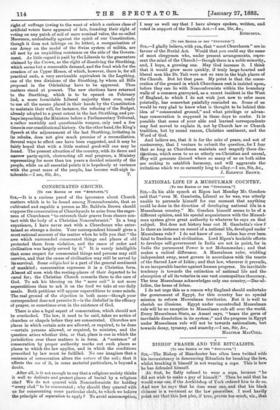CONSECRATED GROUND.
rro THE EDITOR Or THE " SPECTATOR:] SIB,—It is a curious proof of the ignorance about Church matters which is to be found among Nonconformists, that so cultivated and capable a person as Mr. Baldwin Brown should suppose the consecration of Churchyards to arise from the eager- ness of Churchmen "to entrench their graves from chance con- tact with the body of a Christian Nonconformist." In a long experience, I have never met with a Churchman who enter- tained so strange a desire. Your correspondent himself gives a most rational account of the matter when he tells you that "the awe which surrounded consecrated things and places of old protected them from violation, and the cause of order and civilisation was largely served by it." It is surely intelligible that some respect for consecrated, things and persons may still survive, and that the cause of civilisation may still be served by its survival. Some religio loci is a part of the general sentiment of mankind ; consecration expresses it in a Christian form. Almost all men wish the resting-places of their departed to be cared for; the Christian Church commits them to the care of God. To ask his blessing on the "mere soil" is not more superstitious than to ask it on the food we take at our daily meals. Both petitions will appear superstitions to some minds. The real ground of the objection in both cases—though your correspondent does not perceive it—is the disbelief in the efficacy of prayer, or sometimes even in the existence of God.
There is also a legal aspect of consecration, which should not be overlooked. The law, it used to be said, takes no notice of churches or chapels before they are consecrated. Churches are places in which certain acts are allowed, or required, to be done —certain persons allowed, or required, to minister, and the question arises whether this, or that, place is one in which the jurisdiction over these matters is in force. A "sentence" of consecration by proper authority marks out such places as places to which the law applies, and in which the conditions prescribed by law must be fulfilled. No one imagines that a sentence of consecration alters the nature of the soil ; that it affects the use of it, in some material particulars, is beyond a doubt.
After all, is it not enough to say that a religions society thinks it well to dedicate and protect places of burial by a religions rite P We do not quarrel with Nonconformists for holding "every clod" to be consecrated ; why should they quarrel with no for consecrating some particular clods, to which we believe the principle of separation to apply ? To avoid misconception, I may as well say that I have always spoken, written, and. voted in support of the Burials Act.—I am, Sir, &O., EPISCOPITS..






































 Previous page
Previous page